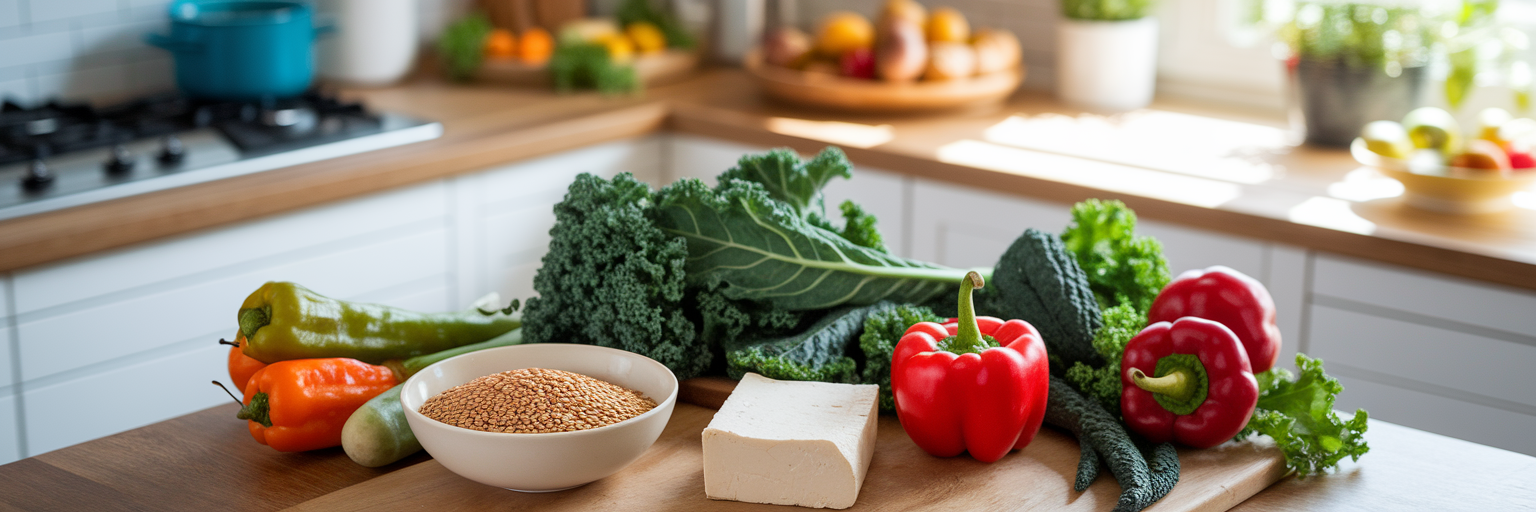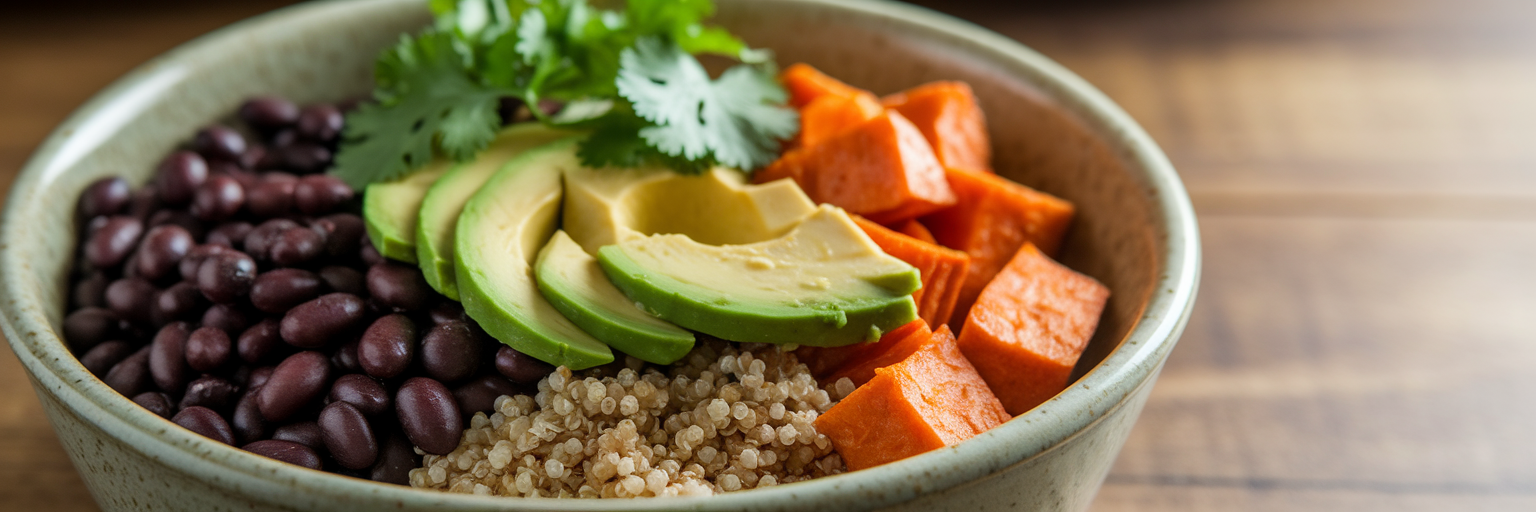If you've ever looked into nutrition, you’ve probably heard the old advice that high-protein diets are bad for your bones. It was a common belief for years, and it seemed to make sense at the time. The idea was that our bodies produce acid when metabolizing animal protein, and to balance things out, we had to borrow calcium straight from our bones. This theory, known as the "acid-ash hypothesis," painted protein as a bit of a villain for skeletal health.
But as our understanding of nutrition has grown, the story has changed completely. We now know that adequate protein is a cornerstone of bone health. In fact, protein makes up about 50% of our bone volume and forms the collagen matrix that gives our bones their flexible strength. Without enough of it, our bones would be brittle and weak.
This shift in understanding brings up an important question for anyone following a plant-based lifestyle. If protein is so important for our skeleton, does the source of that protein make a difference for our bones? Let's explore that.
Debunking the Protein and Bone Health Myth
You might remember hearing the old advice that high-protein diets could weaken your bones. This idea came from a theory called the "acid-ash hypothesis," which suggested that metabolizing animal protein creates acid in the body. To neutralize this acid, the theory went, your body would pull alkaline minerals like calcium directly from your bones, potentially leading to bone loss over time.
However, modern science tells a different story. We now understand that protein is absolutely essential for a strong skeleton. Think of your bones as a building. Calcium and other minerals are the bricks, but protein creates the strong, flexible scaffolding—the collagen matrix—that holds everything together. In fact, about 50% of your bone's volume is protein.
So, instead of harming bones, getting enough protein is crucial for building and maintaining them. This leads to a fascinating question for those on a plant-based diet: if protein is so important, does the source of that protein matter? The answer is yes, and it’s great news for plant-eaters.
The Alkaline Advantage of Plant-Based Diets

Building on that old acid-ash idea, a plant-based diet offers a distinct benefit. While the original theory about protein was incomplete, the concept of "dietary acid load" is still relevant. Diets heavy in animal products can create a higher acid load, prompting the body to find ways to balance its pH. In contrast, a diet rich in fruits, vegetables, and legumes has an alkalizing effect.
This lower acid load means your body doesn't need to "borrow" calcium from your bones to maintain balance. Over time, this helps preserve your bone mineral density. In fact, research is increasingly supporting this connection. As highlighted in a 2024 study from the Journal of Bone and Mineral Research, findings suggest that plant based diet bone density is often well-maintained, partly due to this lower dietary acid load.
Incorporating more alkaline-forming, protein-rich foods is a simple and effective strategy. Here are a few excellent choices:
- Lentils and Chickpeas: These are protein powerhouses that also contribute to an alkaline-forming diet.
- Almonds and other nuts: Great for snacking, they provide protein, healthy fats, and have an alkalizing effect.
- Tofu and Edamame: Soy-based foods are fantastic sources of plant protein.
- Spinach and Kale: Leafy greens are packed with nutrients and help balance your body's pH.
- Quinoa: A complete protein that fits perfectly into an alkaline-focused eating plan.
By focusing on these foods, you’re not just getting protein; you’re actively supporting your body’s ability to keep your bones strong.
More Than Just Protein: Key Bone-Building Nutrients in Plants
When we talk about plant protein and bone health, it's important to see the bigger picture. Plant-based protein sources are more than just protein; they are complete nutrient packages that deliver a host of bone-building vitamins and minerals that work together. This synergy is what makes them some of the best vegan foods for bones.
Magnesium: The Unsung Hero for Vitamin D Activation
We all know calcium is important, but it can't do its job without help. Magnesium plays a critical role in converting vitamin D into its active form, which is necessary for calcium absorption. Without enough magnesium, vitamin D remains inactive. A 2023 review in the American Journal of Clinical Nutrition linked higher magnesium intake directly to increased bone mineral density, highlighting its importance.
Potassium: The Calcium-Sparing Mineral
Potassium is another key player. It helps neutralize metabolic acids in the body, which, as we discussed, reduces the need for your body to pull calcium from your bones. By helping to conserve your body's calcium stores, potassium indirectly supports long-term bone strength.
Vitamin K: The Bone Matrix Builder
Vitamin K is essential for activating osteocalcin and other proteins that are vital for building the bone matrix. Think of it as the foreman on the construction site, directing calcium to the right places to ensure a strong and dense bone structure. Plant foods, especially leafy greens, are fantastic sources of this vitamin.
If you're looking for delicious ways to get more of these nutrients, check out some of our favorite easy vegan protein recipes.
| Nutrient | Role in Bone Health | Top Vegan Food Sources |
|---|---|---|
| Magnesium | Activates Vitamin D for calcium absorption; contributes to bone structure. | Pumpkin seeds, almonds, spinach, black beans, avocado. |
| Potassium | Neutralizes metabolic acids, helping to conserve calcium in the bones. | Sweet potatoes, white beans, bananas, spinach, lentils. |
| Vitamin K | Activates proteins essential for bone mineralization and building the bone matrix. | Kale, spinach, collard greens, broccoli, Brussels sprouts. |
| Calcium | The primary mineral that provides hardness and strength to bones. | Fortified plant milks, tofu (made with calcium sulfate), chia seeds, almonds, leafy greens. |
| Phytochemicals (e.g., Flavonoids) | Provide antioxidant and anti-inflammatory effects that protect bone cells. | Berries, onions, kale, soy products, green tea. |
This table summarizes the key nutrients found abundantly in plant-based diets that work together to support skeletal strength. Food sources are based on data from the USDA FoodData Central.
Building a Complete Protein for Optimal Bone Structure

A common question about plant-based diets is whether they provide "complete" protein. It's a valid concern, especially since essential amino acids are the building blocks for collagen, the protein framework of our bones. The good news is that this is an easily managed part of a vegan diet.
The old myth was that you had to meticulously combine different plant foods at every single meal to get all nine essential amino acids. We now know that’s not necessary. Your body maintains an "amino acid pool," drawing from the foods you eat throughout the day. As long as you eat a variety of plant-based protein sources, your body will have everything it needs. This is a key part of how to strengthen bones on a vegan diet without unnecessary stress.
Simple, everyday food pairings naturally provide a full range of amino acids. Think of classic combinations like:
- Rice and beans
- Hummus with whole-wheat pita
- A peanut butter sandwich on whole-grain bread
Additionally, many plant foods are complete or near-complete protein sources on their own, including quinoa, tofu, edamame, and chia seeds. For those with busy schedules, a well-formulated powder like our chocolate vegan protein is a convenient way to ensure you’re getting a complete amino acid profile to support your bone health.
Fueling Your Active Life with Bone-Supportive Vegan Foods
For active individuals, nutrition is about more than just maintenance; it's about performance and recovery. Your bones are living tissue that responds to the stress of exercise, and providing the right fuel is critical for repair and strengthening. A post-workout meal or snack rich in plant protein is a great way to supply the amino acids needed to repair both muscle and bone tissue.
While a food-first approach is always best, smart supplementation can be helpful. Vitamin D and Vitamin B12 are two nutrients that are often recommended for those on a vegan diet. Many modern vegan protein powders are also fortified with calcium and vitamin D, making them a convenient two-in-one option for supporting vegan athlete bone density.
To build a strong foundation, prioritize a food-first strategy:
- Focus on Whole Foods: Prioritize lentils, nuts, seeds, and tofu to get the full spectrum of synergistic nutrients we discussed earlier.
- Eat the Rainbow: A colorful diet ensures you’re getting a wide range of vitamins, minerals, and phytochemicals that protect bone cells.
- Listen to Your Body: Pay attention to your energy levels and how you recover from workouts. This feedback can help you fine-tune your diet to meet your unique needs.
By combining regular physical activity with a nutrient-dense vegan diet, you create the ideal environment for strong, resilient bones. For more tips on fueling your active lifestyle, feel free to explore our blog.
Innovations in Plant-Based Nutrition for Bones
It's an exciting time for plant-based nutrition. What was once a niche lifestyle has become mainstream, with consumption among active people surging in recent years. This growing interest is driving incredible innovation in food technology, making it easier than ever to support your health on a vegan diet.
One of the most promising advancements is the biofortification of plant proteins. This process enriches foods with key nutrients during production. For example, pea protein can be fortified with extra calcium and vitamin D, creating an all-in-one product designed specifically for bone support.
Thanks to this ongoing research and innovation, the conversation around vegan protein for bone health is more positive than ever. Active individuals can feel confident that a well-planned vegan diet can provide everything they need for excellent long-term skeletal health. If you're ready to see what's new, you can explore our full range of high-quality vegan supplements.



